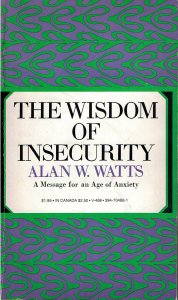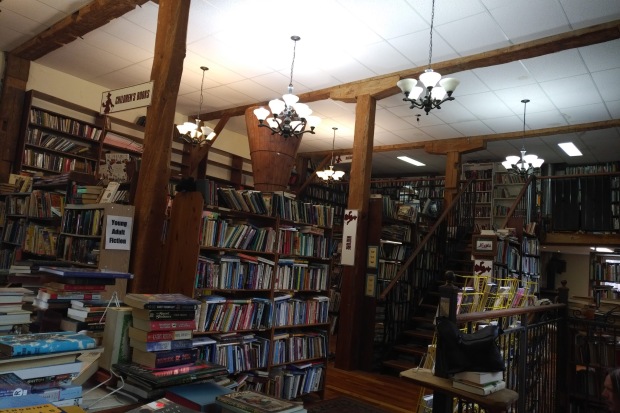
I got this book at the Williamsford Mill in July on our way home from holidays. Before I go any further, if you’ve never been to the Williamsford Mill in Williamsford, Ontario, Canada, it’s a pretty cool place.

I was perusing the second floor looking for nothing in particular when I spotted The Bedside Book of Birds by Graeme Gibson lying horizontally across the top of a completely unrelated shelf of books. That was a huge yes for me. Sitting on top of that book was The Wisdom of Insecurity by Alan W. Watts for two bucks so I bought that too. Good buy.
This is a really interesting little book. I feel like the best thing to do is just to read it, but here we go.
First of all the tagline is ‘A Message for an Age of Anxiety.’ Sounds like now, right now, and apparently 1951 as well. This book proposes that anxiety stems from our desire to feel secure and that the solution to that particular problem is actually accepting that this is impossible. I love this because it makes all kinds of sense to my brain. There is a vaguely familiar ‘live in the moment’ vibe, but oh there is so much more! If you’re only ever looking to the future, the future that does not and might never exist, I might add, yes, that future, you’ll just be chasing it until you die. Here’s a timely little refrain: “The very violence of these political religions betrays the anxiety beneath them – for they are but men huddling together and shouting to give themselves courage in the dark.” pg. 19. Accurate.
It’s not just about living in the moment. It’s that the only thing that actually exists is the moment, and most of us never stop to realize that. “What is the use of planning to be able to eat next week unless I can really enjoy the meals when they come?” pg. 35. Good frigging question, Alan! I don’t know!
So there is a lot going on in this book that I am going to butcher trying to describe. What really struck me about it was the simmering reminder that our entire world and our lives in it are completely made up. The rules, the laws, the social conventions, our jobs, our beliefs, even words, especially words, absolutely everything is just crap we made up. They are not necessarily right, or best, or even useful, just things we made up to please our brains that demand order in a messy world. We know this, on some level, but I found it immensely satisfying to have someone just lay out that even though some of these things are useful, they are still a complete and utter fabrication. Knowing that gives you power, the power of recognition. “What we have forgotten is that thoughts and words are conventions, and that it is fatal to take conventions too seriously…thoughts, ideas and words are “coins” for the real things…ideas and words are more or less fixed, whereas real things change.” pg. 44 – 45. Read that a few times and let it sink in.
So what to do? Crawl into a ditch somewhere and wait for sweet, merciful death to take you? Maybe! Or, “The only way to make sense out of change is to plunge into it, move with it, and join the dance.” pg. 43. Sounds good, but thankfully Alan W. Watts offers plenty of advice and motivation as to how to go about this. “The brain can only assume its proper behaviour when consciousness is doing what it is designed for: not writhing and whirling to get out of present experience, but being effortlessly aware of it.” pg. 73. My brain is really screwed if this is the case, because that is literally all my brain does. Thankfully, instructions on how to get out of this disaster are provided. “It is simply being aware of this present experience, and realizing that you can neither define it nor divide yourself from it. There is no rule but “Look!” pg. 99.
This book stuck a spoon in my brain matter and gave it a stir and I loved it. It’s hard for me to describe what a powerful little book this is and what a shifting and resettling it can cause in your mind. As someone who is somewhat anxious living in a world that is absolutely choking on it, I found some comfort here, some validation and even some hope which is in short supply these days, that maybe we’ve just been looking at everything all wrong. “Nothing is more creative than death, since it is the whole secret of life. It means that the past must be abandoned, that the unknown cannot be avoided, that ‘I’ cannot continue, and that nothing can be ultimately fixed. When a man knows this, he lives for the first time in his life. By holding his breath, he loses it. By letting it go he finds it.” pg. 118.
*I would like to personally apologize to Alan W. Watts and actual philosophers for this meandering review. Just had to get it out of my system.
